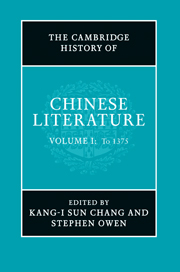Book contents
- Frontmatter
- Introduction
- 1 Early Chinese literature, beginnings through Western Han
- 2 From the Eastern Han through the Western Jin (ad 25–317)
- 3 From the Eastern Jin through the early Tang (317–649)
- 4 The cultural Tang (650–1020)
- 5 The Northern Song (1020–1126)
- 6 North and south: the twelfth and thirteenth centuries
- 7 Literature from the late Jin to the early Ming: ca 1230–ca 1375
- Select bibliography
- Glossary
- Index
- References
3 - From the Eastern Jin through the early Tang (317–649)
Published online by Cambridge University Press: 28 May 2011
- Frontmatter
- Introduction
- 1 Early Chinese literature, beginnings through Western Han
- 2 From the Eastern Han through the Western Jin (ad 25–317)
- 3 From the Eastern Jin through the early Tang (317–649)
- 4 The cultural Tang (650–1020)
- 5 The Northern Song (1020–1126)
- 6 North and south: the twelfth and thirteenth centuries
- 7 Literature from the late Jin to the early Ming: ca 1230–ca 1375
- Select bibliography
- Glossary
- Index
- References
Summary
Literature of the fourth century
The Eastern Jin (317–420): an overview
In 317, Sima Rui (276–322), a member of the Jin royal family, assumed the title of the king of Jin in the old Wu capital, Jiankang, and acted as the new regent of the Jin regime. In the following year Sima Rui formally took the throne as the Jin emperor and would be known to posterity as Emperor Yuan. Jiankang was to the southeast of the former Jin capital, Luoyang; hence, in the tradition of the Zhou and Han dynasties, the regime founded by Sima Rui was designated the Eastern Jin.
The territory of the Eastern Jin was much diminished, with the North fallen under the rule of rival states, and the southwest (modern Sichuan) dominated by the Cheng-Han kingdom until 347; but territorial reduction is not necessarily proportionate to intellectual vigor and cultural splendor. The Eastern Jin and the ensuing four dynasties in the South – Song, Qi, Liang, and Chen – represent a richness of cultural accomplishment on a scale unparalleled in pre-Tang China. Jiankang was to grow into a thriving metropolis, the world’s most populated city in the early sixth century, with a population twice that of Constantinople, and, above all, a dazzling cultural and intellectual center that lasted until a northern dynasty, the Sui, united China in 589 and ordered the city razed to the ground. During this period of division commonly referred to as the Northern and Southern Dynasties, the south, for the first time in Chinese history, ceased being a periphery to the Chinese heartland in the Yellow River valley.
- Type
- Chapter
- Information
- The Cambridge History of Chinese Literature , pp. 199 - 285Publisher: Cambridge University PressPrint publication year: 2010
References
- 3
- Cited by



